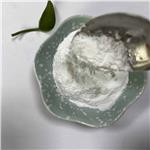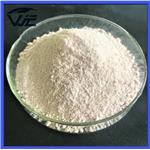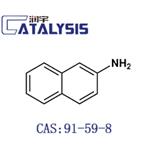2-Naphthylamine [91-59-8]. 2-aminonaphthalene, 2-naphthaleneneamine, b-naphthylamine, C10H9N, Mr 143.18, mp 112℃, bp 306℃, d98 41.061 is steam volatile and is soluble in hot water, ethanol, and ether. It crystallizes from aqueous ethanol as white crystals that turn red on exposure to light and air. Oxidation with hypochlorite, lead dioxide, or air in UV light gives dibenzophenazine. Reduction with sodium in amyl alcohol or catalytic hydrogenation gives mainly 2-aminotetralin. Substition reactions (e.g., halogenation) occur first in the 1-position unless the amino group is protonated, in which case substituents enter the 5- and 8-positions.
Amino and nitrite of Aminonaphthalene can form diazonium salt, and can turn into a variety of hydrocarbon derivatives of naphthalene, it can be used in the manufacture of dyes and organic synthesis, also used as indicators of organic analytical reagents and fluorescent agents.
Since the nitration of naphthalene can not obtain 2-nitro-naphthalene, so the producing methods is different from 1-Naphthylamine. 2-Naphthylamine is derived by 2-naphthol pressurized ammonia solution.
2-Naphthylamine is a white to red crystals
with a faint, aromatic odor. Darkens in air to a reddish-purple color.
White crystals becomes purplish-red on exposure to air. Odor threshold concentrations ranged
from 1.4 to 1.9 mg/m3 (quoted, Keith and Walters, 1992).
2-Naphthylamine was widely used in themanufacture of dyes and in rubber. Currently, its use is curtailed because of thehealth hazard.
An amine compound used for research purposes
It is listed as a known human carcinogen. Used in manufacturing of dyes, as antioxidant in rubber
2-Naphthylamine was previously produced in substantial
amounts for nearly 50 years but is no longer produced
commercially. It is now used exclusively for research, and
only rarely. It was formerly used in the manufacture of
dyestuffs and as an antioxidant in the rubber industry.
Prior to termination of its domestic production and use in
the dye and rubber industries, an estimated 1000 U.S. workers
were possibly exposed to 2-naphthylamine by inhalation
and dermal routes. Currently, laboratory technicians and
scientists who use the compound for research purposes may
constitute the group with the greatest risk of potential exposure.
ChEBI: 2-naphthylamine is a naphthylamine carrying the amino group at position 2. It has a role as a carcinogenic agent.
A white to reddish colored solid in the form of flakes. Slightly soluble in hot water and denser than water. Toxic by ingestion, inhalation and skin absorption. Used to make dyes and agricultural chemicals.
2-Naphthylamine darkens in air to a reddish-purple color (oxidizes). Slightly soluble in hot water and denser than water. Napthyl amines can be slowly hydrolyzed, releasing NH3 as a byproduct [N.L. Drake, Org. React. 1, (1942), 105].
2-Naphthylamine is a weak base. 2-Naphthylamine is incompatible with strong oxidizing agents and strong acids. 2-Naphthylamine is also incompatible with nitrous acid. 2-Naphthylamine reduces warm ammoniacal silver nitrate.
Toxic by ingestion, inhalation, skin absorption; a confirmed carcinogen. Causes bladder cancer.
2-Naphthylamine poses a severe health haz ard because of its carcinogenicity. Admin istration of this compound by all routesresulted in cancers in various tissues in testanimals. It caused tumors in the kidney, blad der, liver, lungs, skin, and blood tissues.There is sufficient evidence that this com pound causes bladder cancer in humans aftera latent period of several years.The toxicity of 2-naphthylamine is lowto moderate. However, high doses can pro duce severe acute toxic effects. The routesof exposures are ingestion, skin contact, andinhalation of its dusts or vapors. The acutetoxic symptoms are similar to those produced by 1-naphthylamine: hemorrhagic cystitis or methemoglobinemia (causing hypoxiaor inadequate supply of oxygen to tissues),respiratory distress, and hematuria (blood inurine).LD50 value, oral (rats): 727 mg/kg.
Combustible material: may burn but does not ignite readily. When heated, vapors may form explosive mixtures with air: indoors, outdoors and sewers explosion hazards. Contact with metals may evolve flammable hydrogen gas. Containers may explode when heated. Runoff may pollute waterways. Substance may be transported in a molten form.
2-Naphthylamine is a human carcinogen that leads predominately to formation of tumors in the epithelium of the bladder. The conclusive epidemiological studies on humans are backed up by a wealth of animal data. However, although a proven carcinogen in mouse, hamster, dog, and monkey, 2-naphthylamine exhibits little, if any, carcinogenicity in rat or rabbit. Several metabolic pathways have been identified, but the main one involves N-hydroxylation followed by rearrangement to 2-amino-1- hydroxynaphthalene. Only the former is a proven animal carcinogen.
Confirmed human
carcinogen with experimental neoplastigenic
and tumorigenic data. Long and continued
exposure to even small amounts may
produce tumors and cancers of the bladder.
Poison by intraperitoneal route. Moderately
toxic by ingestion. Experimental
reproductive effects. Human mutation data
reported. A very toxic chemical in any of its
physical forms, such as flake, lump, dust,
liquid, or vapor. It can be absorbed into the
body through the lungs, the gastrointestinal
tract, or the skin. Combustible when
exposed to heat or flame. At elevated
temperatures it evolves a vapor that is
flammable and explosive. Incompatible with
nitrous acid. When heated to
decomposition it emits toxic fumes of
NOx.
2-Naphthylamine is presently used
only for research purposes. It is present as an impurity in
α-naphthylamine. It is as an intermediate in the preparation
of other compounds. 2-Naphthylamine was widely used in
the manufacture of dyestuffs; as an antioxidant for rubber;
and in rubber coated cables.
2-Naphthylamine is known to be a human carcinogen based on sufficient evidence of carcinogenicity from studies in humans.
Photolytic. Low et al. (1991) reported that the photooxidation of aqueous primary amine
solutions by UV light in the presence of titanium dioxide resulted in the formation of ammonium
and nitrate ions.
Chemical/Physical. Kanno et al. (1982) studied the aqueous reaction of 2-naphthylamine and
other substituted aromatic hydrocarbons (aniline, toluidine, 1-naphthylamine, phenol, cresol,
pyrocatechol, resorcinol, hydroquinone, and 1-naphthol) with hypochlorous acid in the presence of
ammonium ion. They reported that the aromatic ring was not chlorinated as expected but was
cleaved by chloramine forming cyanogen chloride. At lower pHs, the amount of cyanogen
chloride formed increased (Kanno et al., 1982).
2-Naphthylamine will not hydrolyze because it does not contain a hydrolyzable functional group
(Kollig, 1993).
At influent concentrations of 10, 1.0, 0.1, and 0.01 mg/L, the GAC adsorption capacities were 300,
150, 75, and 37 mg/g, respectively (Dobbs and Cohen, 1980).
UN1650 β-Naphthylamine, Hazard Class: 6.1;
Labels: 6.1-Poisonous materials.
Sublime the amine at 180o in a stream of nitrogen. Crystallise it from hot water (charcoal) or *benzene. Dry it under vacuum in a drying pistol. The styphnate has m 194-195o (from EtOH). [Beilstein 12 H 1265, 12 III 2989, 12 IV 3122.] CARCINOGEN.
A weak base. Dust may form explosive
mixture with air. Incompatible with oxidizers (chlorates,
nitrates, peroxides, permanganates, perchlorates, chlorine,
bromine, fluorine, etc.); contact may cause fires or explosions.
Keep away from alkaline materials, strong bases,
strong acids, oxoacids, epoxides. Incompatible with nitrous
acid.
Controlled incineration
whereby oxides of nitrogen are removed from the effluent
gas by scrubber, catalyst, or thermal device. Consult
with environmental regulatory agencies for guidance on
acceptable disposal practices. Generators of waste containing
this contaminant (≥100 kg/mo) must conform with
EPA regulations governing storage, transportation, treatment,
and waste disposal.



